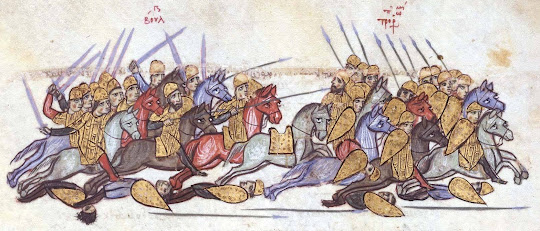Melias (in Greek) or Mleh (Mleh-Mec, 'Mleh the Great', in Armenian sources) was a famous Armenian prince who fought alongside the Romans against the Arab caliphates in the early tenth century. He seems to have become a folk-hero, and may have inspired the character of Melementzes in the epic poem, Diogenes Akrites. This is one of the tiny handful of 'acritic' epics, celebrating the exploits of border lords in Anatolia, to have survived into the modern era.
The historical Melias appears frequently in Roman and Arab sources. He came from an Armenian noble family, and was probably the grandson of Mliah, prince of Varazhnunik, killed by the Arabs in 853. Melias himself first appears as a vassal of Ashot the Long-Armed, an Armenian prince, who entered Roman service in 890.
Melias first saw action at the disastrous battle of Bulgarophygon in 896, where the Bulgars destroyed the Roman army. His master, Ashot, was killed, along with most of the Armenian contingent. Melias was one of the few who managed to escape.
He returned to imperial service in the East, and led a troop of Armenian border fighters, the famous Akritai, against the Arabs of Tarsus. Between fighting the Arabs, he led the life of a robber baron, stealing cattle from pastures and horses from the Roman army. He might be compared to 'Border Reiver' chieftains on the Anglo-Scottish border, centuries later.
Despite his crimes, Melias was too useful to be punished. Emperor Leo the Wise made him tourmarches or governor of a mountainous frontier zone near the Tarsus mountains. The idea was that Melias and two other Armenian chiefs would hold the line against the Arabs, enabling the main army to operate elsewhere.
Melias did far more than that. Of these new border-guardians, he was the only one to survive and prosper. While his comrades were killed in battle, or accused of treason, he pushed further into the mountains and captured the old fortress of Lykandos. The Arabs failed to dislodge him, and referred to Melias as sahib al-Durab (Lord of the Passes).
In recognition of his success, Melias was made strategos of Lykandos, along with the rank of patrician and magistrate. In 917 he was sent to take part in another campaign against the Bulgars, in which the Romans fell to another heavy defeat. According to Leo the Deacon, writing 75 years later, the bones of slaughtered Roman soldiers could still be seen:
"...And even now there could be seen piles of bones at Anchialus, where the fleeing army of the Romans was disgracefully slain..."
The bones of Melias, however, were not among them. Once again he escaped the bloody field, and went back to the East. The most glorious part of his career lay ahead.

No comments:
Post a Comment